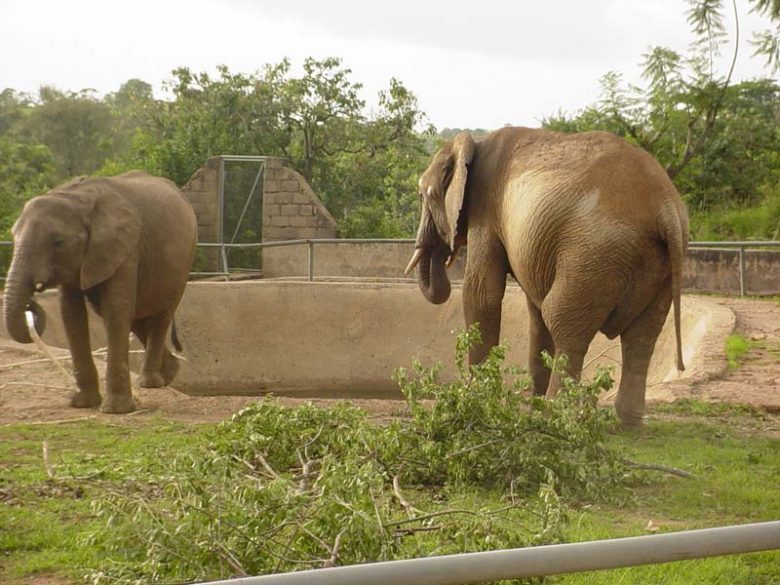Recently, there were reports of a lion killed by hunters in Konduga Local Government Area of Borno State.
This was confirmed by the Director of Forestry and Wildlife of the Borno State Ministry of Environment, Peter Ayuba, who said the lion may have escaped from the Waza Game Reserve in Cameroon.
- NIGERIA DAILY: No Road To The North As Terrorists Run Berserk In Kaduna
- Tension at Nigerian border communities after Cameroon’s encroachment
Ayuba told newsmen of similar incidents of elephants, hyenas and other animals from the wild straying into some local governments in the area and getting killed.
Such incidents are not restricted to Borno State alone. There are similar reports of hippopotamuses and crocodiles being killed in Taraba and of an elephant shot and killed by poachers in Ogun State. According to the reports, that was the fourth elephant killed in two years in the area, raising alarm that at this rate the elephant population which has been dwindling steadily over the years will hit nought in no distant future. We, therefore, frown upon the killing of our wildlife/wild animals by hunters and celebration of such as was witnessed recently in Konduga and urge that it be discontinued.
For years, wildlife conservationists and concerned environmentalists have been raising concern at the rate at which wildlife species are either being killed and driven from their natural habitat for several reasons.
Some of the reasons are attributed to the rapid population growth in the country which necessitates the need for more land for housing, access roads and industrial development.
Other reasons observed are driven by commercial purposes by poachers and hunters who intend to sell the body parts of these wild animals for profit and medicinal use.
In the process our national parks, zoos and wildlife conservation areas established to protect the wild animals and provide them with a sanctuary for their natural existence have either been pulled down and converted to other purposes or neglected and left to rot.
It bears reminding that the existence of wild animals is a necessary part of the life circle. They play a very crucial part in our ecosystem by helping to preserve the flora and fauna of our delicate collective existence as inhabitants and inheritors of the earth.
Wildlife also form part of our folklore which intrinsically links generations past with the present and provides a treasure trove of positive information and practises for future generations.
In this regard, the existence of wild animals around us also serves as reminder of the wonders of the gifts of creation which provides us humans with unique knowledge and insights into some of the mysteries of creation and which helps us to solve some of our existential challenges.
For innumerable reasons, therefore, wildlife is not just indispensable to our human existence but to the earth as a whole in all its forms and features.
That is why in recognition of this, there is in existence strict laws at both national and international levels for the protection and preservation of wild animals endangered by the unrestrained activities of humans.
In the case of Nigeria, although such laws exist they are practised in the breach or not enforced at all leading to the near extinction of some of these animals.
Some of the reasons for the laxity in the application of the laws on wildlife preservation may have to do with the clash with our culture and traditions which valorise the killing of wild animals like lions, hyenas and elephants. In some cases also, especially in the rural areas, attempts are made to justify the killing of some of these animals on the need to curb their frequent forays into villages attacking and killing humans and their livestock.
While we cannot ignore our traditions in which wild animals feature quite prominently as beasts of booty and fame, as well as the dangers that some of them pose to inhabitants in rural areas, the solution can certainly not be found in their wanton and brutal killing.
Indeed the laws on wildlife protection which have been enacted in Nigeria and internationally of which the country is signatory to, make provision for such situations. Where animal population gets to the level where they threaten the existence of humans and their livelihoods, the laws call for culling of such animals to reduce the dangers and balance the life cycle.
Accordingly, we call on governments at all levels to be alive to the dangers of unnecessary killing of wild animals whose numbers are fast dwindling in the country as a result of such acts. This should be done through the diligent enforcement of the extant laws that seek to protect and preserve wildlife from which we all derive immense benefits as members of the life cycle. Also, we call for sensitization on the dangers of killing animals and what citizens can do whenever they find them roaming around.

 Join Daily Trust WhatsApp Community For Quick Access To News and Happenings Around You.
Join Daily Trust WhatsApp Community For Quick Access To News and Happenings Around You.


